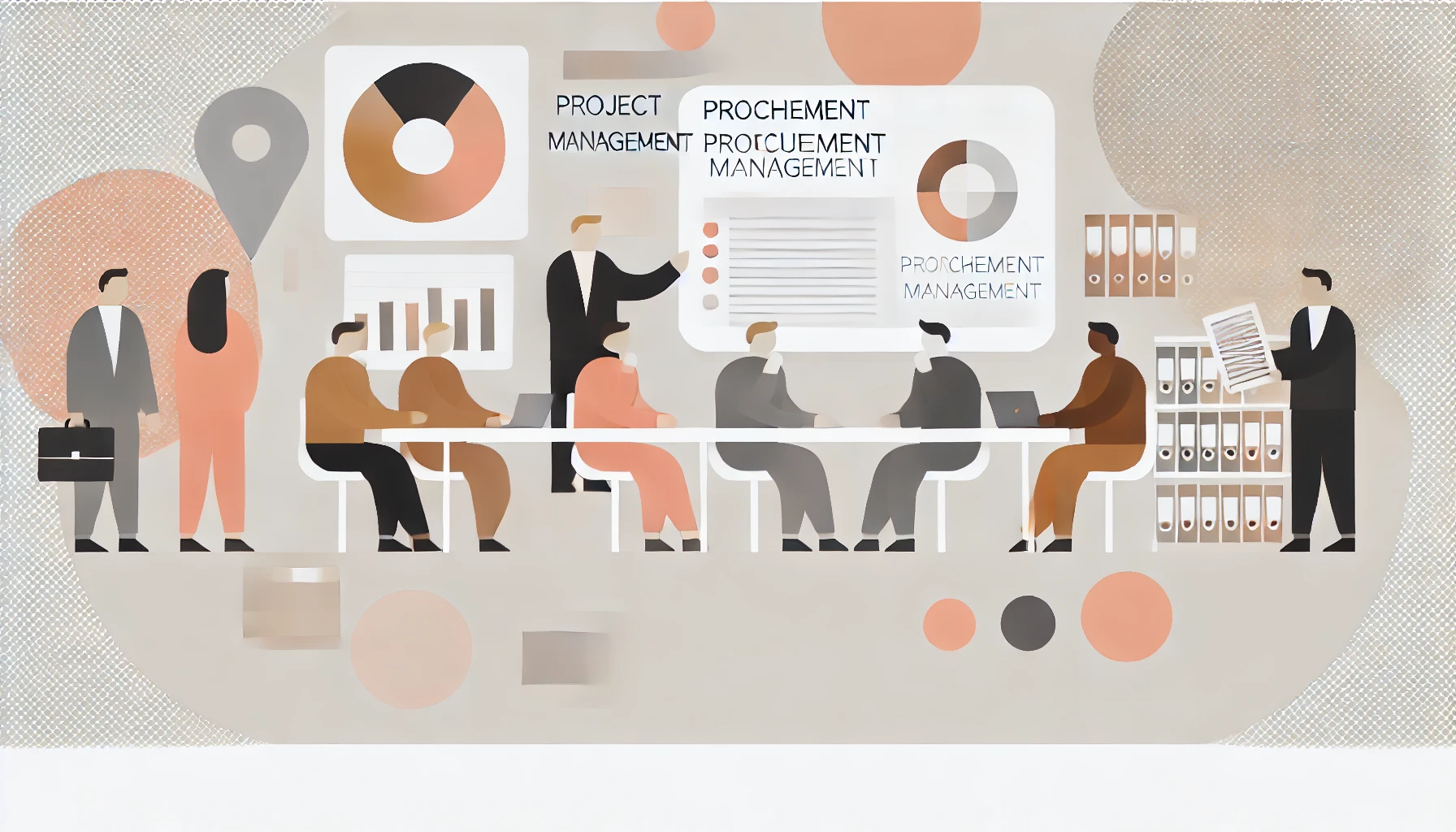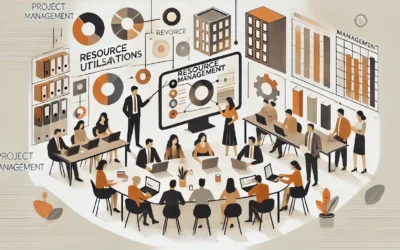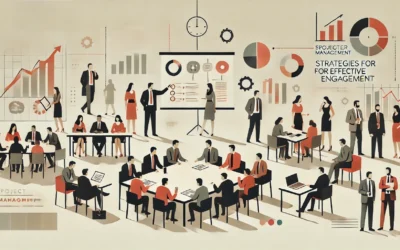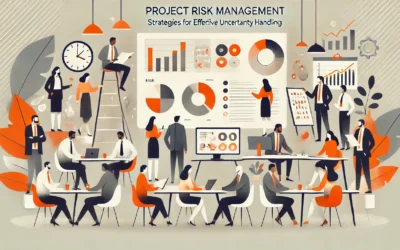Introduction
Procurement Management is a critical component of successful project execution, focusing on the processes necessary to purchase or acquire products, services, or results needed from outside the project team. Recognised by the Project Management Institute (PMI) as one of the key Knowledge Areas, Procurement Management provides a structured approach to planning, conducting, controlling, and closing procurements throughout the project lifecycle.
In this comprehensive guide, we will explore the key components of Procurement Management, its significance in the project process, and practical strategies for project managers to implement it effectively. By mastering these techniques, managers can enhance project value, reduce risks associated with external procurement, and significantly increase the likelihood of project success.
Effective procurement management isn’t just about buying goods and services; it’s about strategically acquiring resources that align with project objectives, managing supplier relationships, and ensuring value for money. As we navigate through the complexities of modern project execution, the ability to effectively manage procurements becomes increasingly crucial. This article aims to equip you with the knowledge and tools to excel in this critical aspect of project management.
What is Procurement Management?
Project Procurement Management involves the processes necessary to purchase or acquire products, services, or results needed from outside the project team. This Knowledge Area focuses on four main processes: Plan Procurement Management, Conduct Procurements, Control Procurements, and Close Procurements.
Effective Procurement Management is essential for ensuring that all necessary project resources are obtained in a timely and cost-effective manner, while also managing the risks associated with external procurement. It encompasses various methodologies and tools designed to systematically plan procurement needs, select suppliers, manage contracts, and evaluate procurement performance throughout the project lifecycle. In today’s globalised business environment, where projects often rely heavily on external resources and expertise, procurement management has become a key factor in project success and organisational efficiency.
This aspect of project management is not a one-time effort but a continuous process that runs from project initiation to closure. It requires a deep understanding of project requirements, market conditions, legal and regulatory frameworks, and organisational policies. Project leaders must be adept at balancing the need for external resources with internal capabilities, while also managing the complexities of supplier relationships and contract management.
Moreover, Procurement Management extends beyond just purchasing goods and services. It also involves strategic decision-making about make-or-buy choices, supplier relationship management, and aligning procurement activities with overall project and organisational objectives. By fostering a procurement-conscious culture within the project team, managers can ensure that procurement considerations are integrated into every aspect of the project, leading to more efficient resource utilisation and better project outcomes.
Key Components of Procurement Management
Plan Procurement Management
Plan Procurement Management is the process of documenting project procurement decisions, specifying the approach, and identifying potential sellers. This process results in a procurement management plan that outlines:
- Types of contracts to be used
- Risk management issues
- Whether independent estimates will be used and if they are needed as evaluation criteria
- Those actions the project management team can take unilaterally if the organisation has a prescribed procurement department
- Standardised procurement documents, if they are needed
- Managing multiple suppliers
- Coordinating procurement with other project aspects, such as scheduling and performance reporting
- Constraints and assumptions that could affect planned procurements
- Handling long lead times to purchase items and coordinating extra time needed into the project schedule
- Handling make-or-buy decisions and linking them into the Activity Resource Estimating and Develop Schedule processes
- Setting the scheduled dates in each contract for the contract deliverables and coordinating with the project scheduling processes
- Identifying leading indicators of performance for use in managing contracts
- Defining the seller performance metrics to be used
A well-developed procurement management plan ensures that procurement activities align with project needs and organisational policies. It serves as a roadmap for all procurement-related activities, providing clarity and direction to the project team.
The planning process should consider various factors, including project scope, schedule, budget, risks, and organisational capabilities. It’s important to involve relevant stakeholders, including legal and procurement specialists, in the planning process to ensure all aspects of procurement are adequately addressed.
Conduct Procurements
Conducting Procurements is the process of obtaining seller responses, selecting a seller, and awarding a contract. Key activities include:
- Preparing procurement documents
- Advertising procurement opportunities
- Gathering independent estimates
- Selecting sellers
- Negotiating contracts
- Awarding contracts
Effective procurement execution requires careful attention to detail and adherence to established procurement procedures. It involves not just selecting the most cost-effective option, but considering factors such as quality, reliability, and alignment with project objectives.
The process of conducting procurements should be transparent and fair, ensuring equal opportunity for all potential suppliers. It’s important to maintain clear communication with potential suppliers throughout the process and to document all decisions and their rationales.
Control Procurements
Controlling Procurements involves managing procurement relationships, monitoring contract performance, making changes and corrections as needed, and closing out contracts. Key activities include:
- Monitoring contract performance
- Performing contract reviews
- Managing changes to contracts
- Managing supplier relationships
- Monitoring procurement risks
Effective procurement control ensures that both the buyer and the seller meet their contractual obligations. It involves regular monitoring of supplier performance against agreed-upon metrics and taking corrective action when necessary.
This process also involves managing changes to contracts, which may be necessary due to changes in project scope, schedule, or other factors. Any changes should be carefully evaluated for their impact on the project and formally documented through established change control procedures.
Close Procurements
Closing Procurements is the process of completing each project procurement. Key activities include:
- Verifying that all work and deliverables are acceptable
- Finalising open claims
- Updating records to reflect final results
- Archiving information for future use
Proper closure of procurements is crucial for ensuring all contractual obligations have been met and for documenting the final outcomes of procurement activities. This process provides a formal end to the contract and helps prevent any future disputes or misunderstandings.
The closure process should include a thorough review of all procurement activities, documenting lessons learned for future projects. This information can be invaluable for improving procurement practices in subsequent projects.
Importance of Procurement Management
Effective Procurement Management is crucial for project success for several reasons:
- Cost Control: By effectively managing procurements, project managers can ensure that goods and services are obtained at the best possible price without compromising quality. This can have a significant impact on the overall project budget. Proper procurement management also helps in avoiding unnecessary purchases and in leveraging economies of scale, further contributing to cost control.
- Risk Mitigation: Procurement activities often involve significant risks, including supplier non-performance, quality issues, and contractual disputes. Effective procurement management helps in identifying and mitigating these risks. By carefully selecting suppliers, negotiating favourable contract terms, and actively managing supplier relationships, project managers can reduce the likelihood and impact of procurement-related risks.
- Quality Assurance: Procurement management plays a crucial role in ensuring the quality of externally sourced goods and services. By setting clear quality standards in procurement documents and contracts, and by monitoring supplier performance, project managers can maintain high quality standards throughout the project. Effective procurement management also allows for the selection of suppliers with a proven track record of delivering high-quality products or services.
- Schedule Management: Timely procurement of goods and services is often critical to maintaining the project schedule. Effective procurement management ensures that necessary resources are available when needed, preventing delays in project activities. This includes managing long lead times for certain items and coordinating procurement activities with the overall project schedule.
- Compliance and Governance: In many organisations and industries, procurement activities are subject to strict regulations and internal policies. Effective procurement management ensures compliance with these requirements, reducing legal and reputational risks. It also provides a clear audit trail of procurement decisions and activities, which is crucial for transparency and accountability.
- Relationship Management: Building and maintaining positive relationships with suppliers can lead to numerous benefits, including better service, more favourable terms, and increased flexibility. Effective procurement management includes strategies for developing and nurturing these relationships. Good supplier relationships can be particularly valuable when facing project challenges or when quick turnaround is needed on urgent requirements.
- Innovation and Value Addition: Strategic procurement management can be a source of innovation and added value for the project. By engaging with suppliers early and fostering collaborative relationships, project managers can tap into supplier expertise and innovative solutions. This can lead to improvements in project deliverables, processes, or overall value proposition.
Practical Tips for Effective Procurement Management
Develop a Comprehensive Procurement Strategy
Create a detailed procurement strategy that aligns with project objectives and organisational policies. This strategy should outline what needs to be procured, when, how, and from whom. Consider factors such as:
- Make-or-buy decisions
- Types of contracts to be used
- Risk management approaches
- Supplier selection criteria
- Performance metrics for suppliers
Remember that the procurement strategy should be flexible enough to adapt to changing project needs or market conditions.
Conduct Thorough Market Research
Invest time in understanding the supplier market for the goods and services you need to procure. This includes:
- Identifying potential suppliers
- Understanding market trends and pricing
- Assessing the competitive landscape
- Identifying potential risks in the supply chain
Good market research can help in making informed decisions about procurement approaches and can lead to better value for money.
Establish Clear Evaluation Criteria
Develop clear and objective criteria for evaluating supplier proposals. These criteria should reflect the project’s priorities and might include factors such as:
- Price
- Quality
- Technical capability
- Past performance
- Financial stability
- Alignment with project values (e.g., sustainability, diversity)
Ensure that all stakeholders involved in the procurement process understand and agree on these criteria before soliciting proposals.
Use Appropriate Contract Types
Select contract types that are appropriate for the specific procurement and that allocate risk fairly between the buyer and seller. Common contract types include:
- Fixed-price contracts
- Cost-reimbursable contracts
- Time and materials contracts
Consider the nature of the work, the level of definition in the requirements, and the market conditions when choosing a contract type. Remember that different contract types may be appropriate for different procurements within the same project.
Implement Robust Contract Management
Develop and implement processes for effectively managing contracts throughout their lifecycle. This includes:
- Regularly monitoring supplier performance against agreed metrics
- Managing changes to contract terms or scope
- Ensuring all parties meet their contractual obligations
- Maintaining clear communication with suppliers
Consider using contract management software to help track contract milestones, deliverables, and performance metrics.
Manage Procurement Risks
Identify and manage risks associated with procurement activities. This might include:
- Supplier financial stability risks
- Quality risks
- Delivery timeline risks
- Compliance risks
Develop risk mitigation strategies for significant procurement risks and monitor these risks throughout the project lifecycle.
Foster Supplier Relationships
Invest in building positive relationships with key suppliers. This can lead to better service, more favourable terms, and increased flexibility. Consider:
- Regular performance review meetings
- Clear and open communication channels
- Collaborative problem-solving approaches
- Recognition for exceptional performance
Remember that good supplier relationships can be particularly valuable when facing project challenges or when quick turnaround is needed.
Leverage Technology
Utilise procurement management software and tools to streamline procurement processes. This might include:
- e-procurement systems
- Contract management software
- Supplier relationship management tools
- Data analytics tools for spend analysis
Ensure that your team is trained in the use of these tools to maximise their effectiveness.
Ensure Compliance and Ethics
Develop and enforce clear policies for ethical procurement practices. This includes:
- Avoiding conflicts of interest
- Ensuring fair competition among suppliers
- Maintaining confidentiality of supplier information
- Complying with all relevant laws and regulations
Regular training for team members involved in procurement activities can help ensure compliance with these policies.
Conduct Post-Procurement Evaluations
After each significant procurement, conduct a thorough evaluation of the procurement process and outcomes. Consider:
- Whether the procurement met project needs
- The effectiveness of the supplier selection process
- Contract management effectiveness
- Lessons learned for future procurements
Use these evaluations to continuously improve your procurement practices and to inform future procurement strategies.
Conclusion
Procurement Management is a critical aspect of successful project execution. By developing and implementing effective procurement strategies, project managers can ensure that necessary resources are acquired efficiently, risks are managed effectively, and project value is optimised.
The key to effective Procurement Management lies in understanding that it’s not just about buying goods and services, but about strategically acquiring resources that align with project objectives and organisational goals. By leveraging a mix of thorough planning, strategic sourcing, effective contract management, and proactive supplier relationship management, you can create a project environment where procurement activities contribute significantly to project success.
Remember that procurement management is not a one-size-fits-all approach. As you apply the strategies and tips outlined in this article, tailor them to your specific project needs and organisational context. With practice and dedication, you can master the art of project Procurement Management and significantly enhance your overall project management effectiveness.
Stay tuned for more detailed articles on each of the Project Management Knowledge Areas, where we will explore best practices, practical tips, and advanced techniques to help you excel in your project management career.






0 Comments